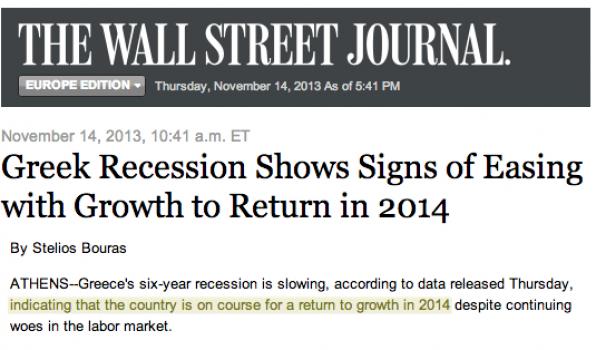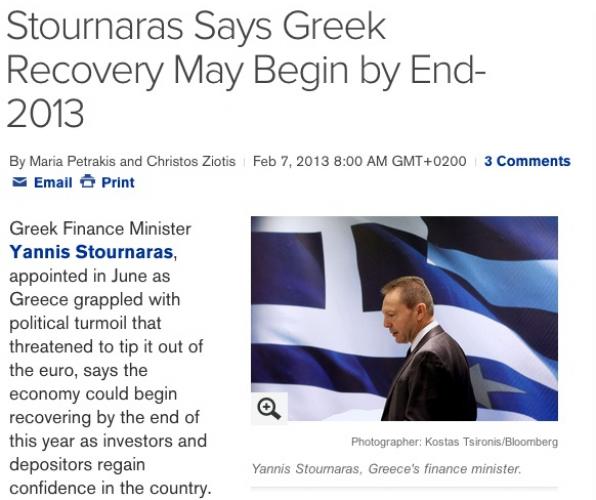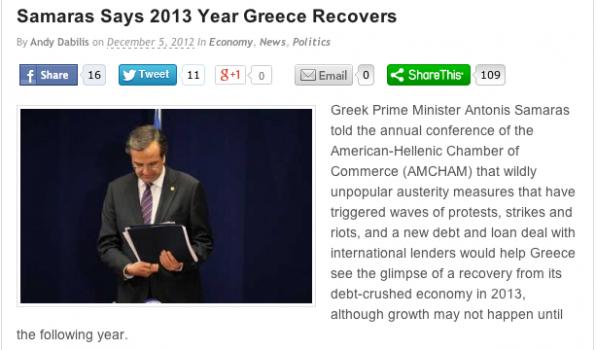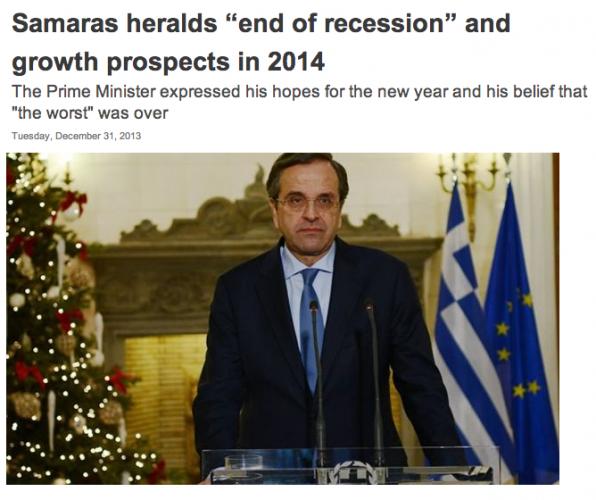By Pavlos Zafiropoulos
If at first you don’t succeed… well just say you were right all along but that it’s taking a bit longer than you expected. At least if you hold public office or are in charge of a major international organization responsible for managing hundreds of billions of euros and/or steering the European economy and the lives of millions of people.
As the new year dawns, all hope that 2014 will bring better tidings than 2013. And when it comes to the Greek economy it even appears that there is room for cautious optimism, with both Greek leaders and the country’s lenders boldly predicting that 2014 will be the year that the economy finally emerges from its interminable recession.
Of course that might be more reassuring if they all hadn’t made exactly the same predictions for 2013, 2012 and, yes, 2011.
Here we present the eternal sunshine of fiscal minds:
1. The European Commission
When searching for words to describe the European Commissioner for Economic and Monetary Affairs Olli Rehn, ‘sunny optimist’ is not normally the first phrase to spring to mind. Yet as these news stories from yesteryear show, in between his finger wagging over fiscal discipline, Mr Rehn is not above making a few unrealistic projections of his own:
In 2010 Mr Rehn was reported as saying that Greece was ‘on the right track’ to return to growth in 2011:

Source: Xinhua, December 10, 2010
2011 may have been a tad over-optimistic, but the European Commission remained confident that growth would come in 2012:

Source: Greek Reporter, May 6, 2010

Source: ANSA via Greek Reporter
…actually no, wait – 2014. Growth will come in 2014. We think.

Source: Wall Street Journal, November 14, 2013
BONUS OPTIMISM: It’s not only on the question of growth that Mr Rehn has been over-confident. Here he is stating categorically in May of 2011 that a restructuring of Greece’s was not on the agenda and was a terrible idea. That’s a year later before it went ahead and happened.

Source: Der Spiegel
2. The International Monetary Fund
Many countries fear the arrival of the IMF. However the international fund doesn’t just bring doom and gloom, but glass is half-full economic projections, even when that glass is completely empty and shattered on the ground. Whether under the leadership of Dominique Strauss-Kahn or Christine Lagarde, the IMF has always been consistent. Consistently wrong.
The IMF was one of the earliest optimists predicting the Greek economy would grow as early as 2010:
Source: Greece and the IMF: 2009 Article IV Consultation Concluding Statement of the Mission
Or as early as 2011, but if not definitely by 2012:

Source: Dominique Strauss Kahn interview with Kathimerini, December 12, 2010.
Then 2013 was to be the year for growth:
Source: New Europe, March 16, 2012.
And now 2014! Hooray for growth!
Source: World Economic Outlook and Fiscal Monitor released on April 16, 2013.
3. The Organization for Economic Cooperation and Development
The OECD may not be part of the troika but that wasn’t going to stop them from getting in on the positivity. Here they are predicting growth for 2012.

Source: Kathimerini, May 25, 2011
And when that didn’t work out they went for 2013:

Source: MNI, November 28 2011
…and, of course now 2014:
Source: OECD / Greece – Economic forecast summary (November 2013)
4. Greek Ministers of Finance
George Papaconstantinou was Finance minister when the first MoU was signed with Greece’s lenders, and was very confident about the ‘stimulating’ effect austerity would have on the economy leading to growth in 2011:

Source: The Guardian, January 14, 2010
When that didn’t happen in 2011, Mr Papaconstantinou refused to be disheartened by facing reality, instead somehow believing that massive cuts in government spending and huge and unfair tax increases somehow amounted to a ‘supply shock’ to the economy. Whatever that is. So he predicted growth ‘next year,’ meaning 2012, meaning he was totally and utterly wrong:

Source: Financial Times, June 28, 2011
Following the elections of May 2012, Mr Papaconstantinou was sent away to make gross forecasting errors from the comfort of his own home and was replaced in the finance ministry by Yannis Stournaras who picked right up where Mr Papaconstantinou left off predicting economic growth in 2013:

Source: Bloomberg, February 7, 2013
Or 2014:

Source: To Vima, May 30 2013
But not to be outdone the Prime Minister Antonis Samaras also predicted recovery in 2013 (which somehow passed by the 26% of the population that is unemployed):

Source: Greek Reporter, December 5, 2012
And in 2014 we will have even more growth! Not to mention free Wifi throughout the entire country…

Source: To Vima, December 31, 2013
So at the dawn of 2014, Greeks can take heart that this year will be the year that the economy finally turns around. And even if this also proves to be an over-optimistic assessment then we can still be sure that it will happen in 2015. Probably.
The important thing is just that our leaders stay true and consistent with their predictions that growth is right around the corner. Because surely, one day, eventually, events will bear them out. And then they will finally say what they haven’t been able to all these years: ‘See? we told you so.’
To put it another way, if it’s raining today, predict sunny weather for tomorrow, and one day you’ll be correct. In the meantime you too can enjoy the eternal sunshine of a fiscal mind.
The inspiration for this article came from a piece orginally published on alt.news site luben.tv.
Writing by Pavlos Zafiropoulos; Editing by Dimitris Bounias and Nikolas Leontopoulos


